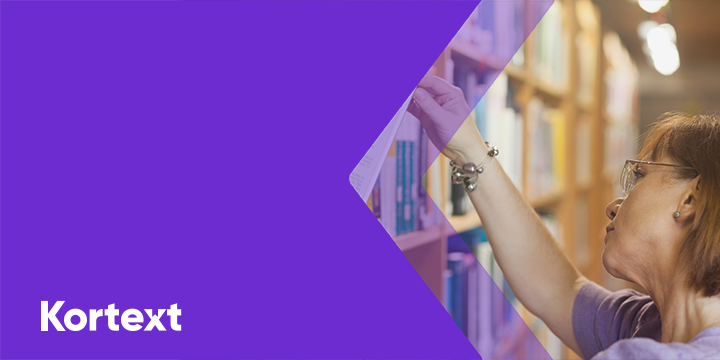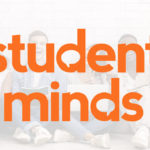Kortext received a fantastic response to this year’s librarian survey, and we’ve gained valuable insight into the perceptions, challenges and expectations of university librarians with regards the provision of eTextbooks.
Growing involvement in teaching and learning; increasing engagement with the university research mission; multiple considerations when selecting eTextbook providers; and continued budget concerns – the weight of expectation on the university library community is considerable.
The role of the university library is ever changing, with library staff becoming increasingly involved in – and many would say integral to – the teaching and learning experience. In this year’s Annual Librarian Survey, Kortext set out to further understand the perceptions, challenges and expectations of university librarians with regards the provision of eTextbooks and eTextbook platform functionality, and also how they see their role changing in the next 12 months.
The responses are now in! Over 60 library staff (institutions undisclosed) took part, answering some or all of our questions, with roles ranging from Director of Library Services and Head of Learning Resources to Faculty Librarian, Principal Library Assistant and Acquisitions Librarian.
Inadequate library budgets
Over 80% of participants agreed that their library plays a significant part in both teaching and learning, with 60% expecting this involvement to increase over the next 12 months. However, pricing models and the cost of eTextbooks continue to be pain points and over 40% of librarians surveyed expressed concern that their library will not be adequately funded by the university to meet the needs of students.
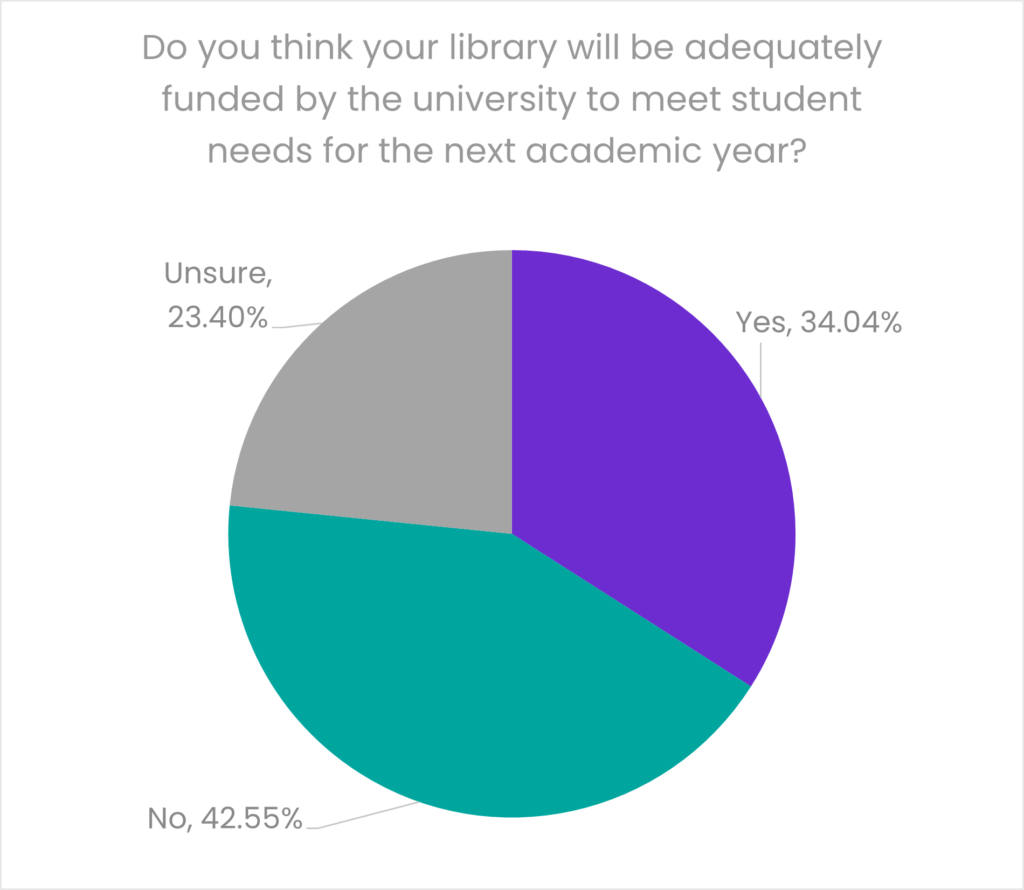
So, are Open Educational Resources the future?
Budget cuts over the years have put affordability firmly on the agenda for universities as they try to strike a balance between cost-cutting and maintaining quality and value for their students – and this is especially true of today’s university library.
More than three-quarters of participants said that Open Educational Resources (OERs) have become more important at their institution in the last 12 months – unsurprising considering the sudden demand for digital resources during the pandemic and the drive for more affordable academic resources.
Linked to this is the library’s role in its university’s research mission, with 86% of participants recognising that their library is either involved with or integral to its success.
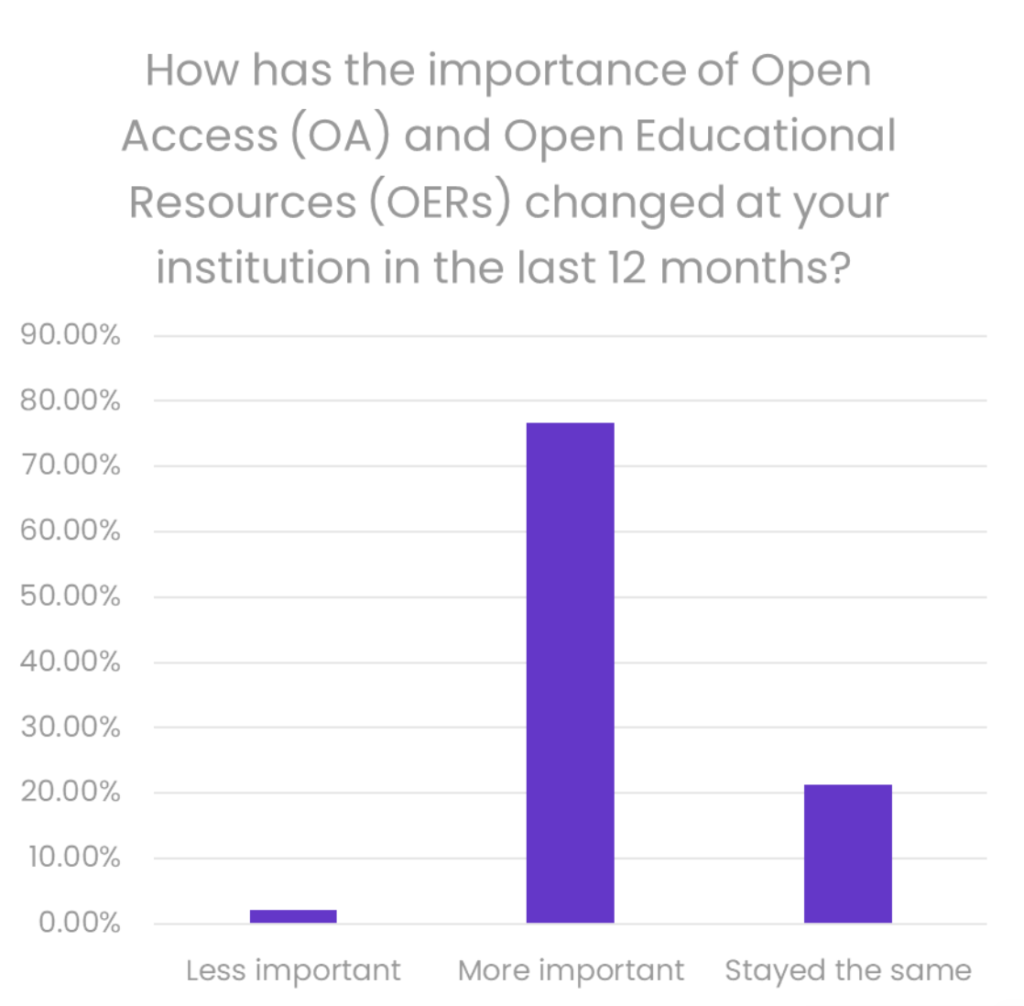
If OERs and Open Access (OA) publications will, indeed, become more widely used in teaching and learning over the next 10 years as many predict, it’s safe to assume that the library’s involvement is likely to continue, if not increase, during that time as universities drive the publication of more research to build the bank of free academic content available to their students.
That said, it’s important to remember that whilst the internet is bursting with OER content, it’s not always easy to find, which is why curated, searchable collections such as “KORC” from Kortext are becoming more popular.
Demand for eTextbooks hasn’t peaked
Despite the appetite for more OER content, it is clear that eTextbooks are still in high demand with more than half of the librarians surveyed saying that their eTextbook spend has increased in the last 12 months.
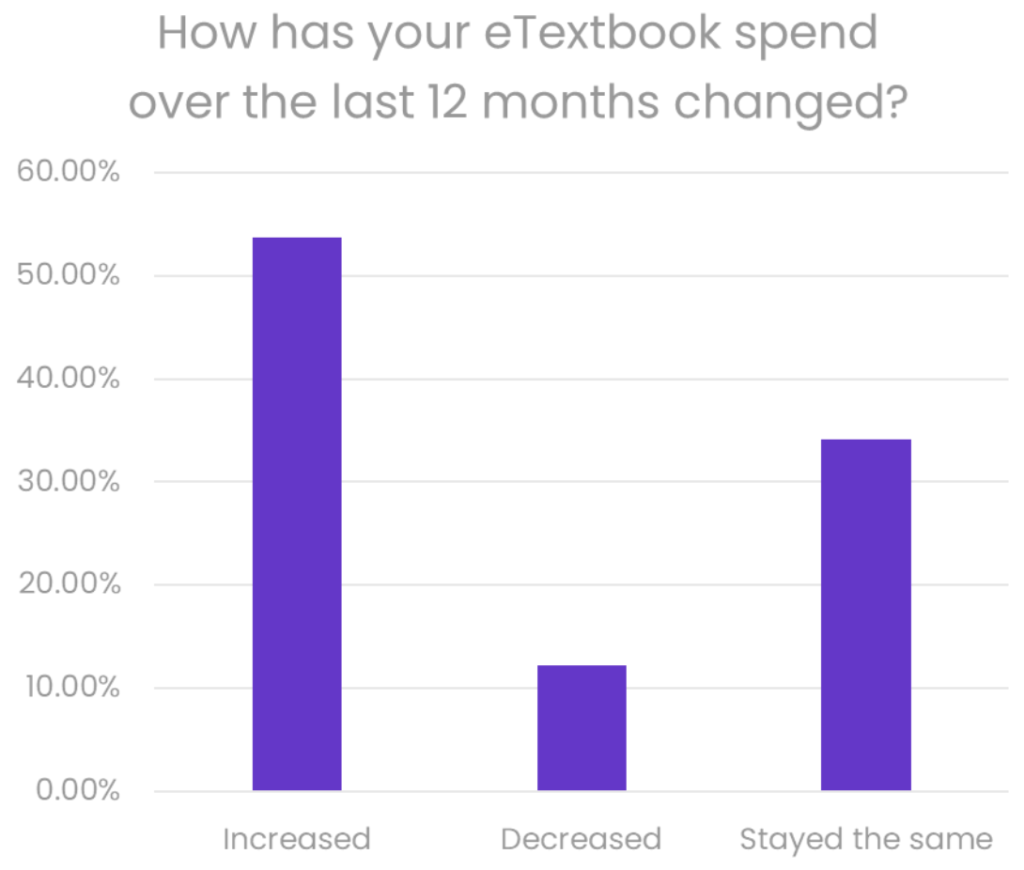
Reasons for this increase differ from institution to institution, but participants have cited the following as motivations for adopting more digital learning content:
- A lack of physical storage space for their growing student base
- Students becoming accustomed to digital book provision
- Their institution’s e-first policy.
We asked librarians how much of the borrowing at their university is digital compared with print – 68% of participants estimated that digital borrowing accounts for 40% or more of the borrowing at their institution, with almost a quarter of participants estimating this figure to be over 70%.
Whilst it’s important to recognise that more than one of the institutions represented in this survey has an e-first policy and therefore is likely to have a high percentage of digital borrowing, it is clear from this question that eTextbooks and other multimedia content are increasingly in adoption in the more prevalent digitally enhanced learning landscape.
eTextbook platform benefits
Whilst print books are still a staple for most university libraries, it is undeniable that modern, interactive eTextbooks afford far more student engagement opportunities. We asked our participants to rate the importance of students being able to easily interact with learning resources within an interactive learning platform such as the Kortext on a scale of 1 to 10.
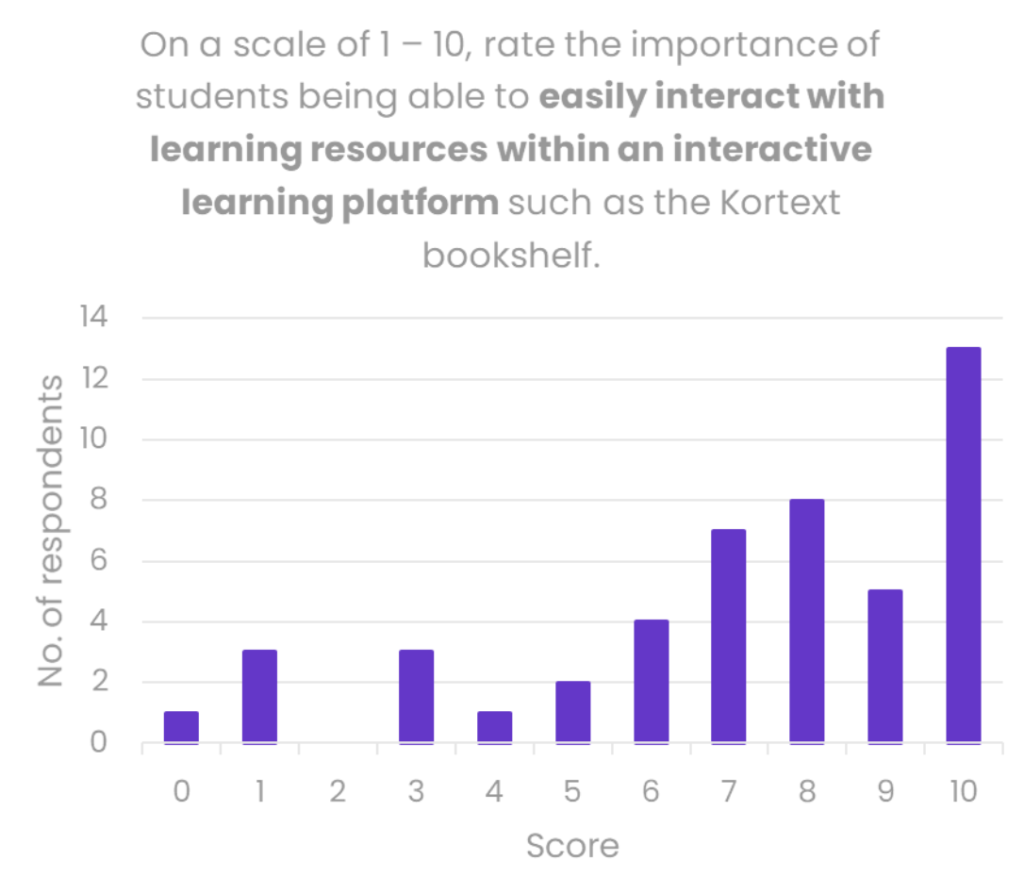
Over a quarter of respondents (28%) scored interactive platforms 10 out of 10 on importance, with more than three-quarters of respondents (79%) giving a score of 6 or more, suggesting that platforms like Kortext are considered a beneficial tool for students when driving engagement with learning content.
When asked to score the features of eTextbook platforms out of 10, accessibility, search tools and easy referencing came out on top as the most beneficial features for supporting teaching and learning – all features that make the study experience simpler for the student.
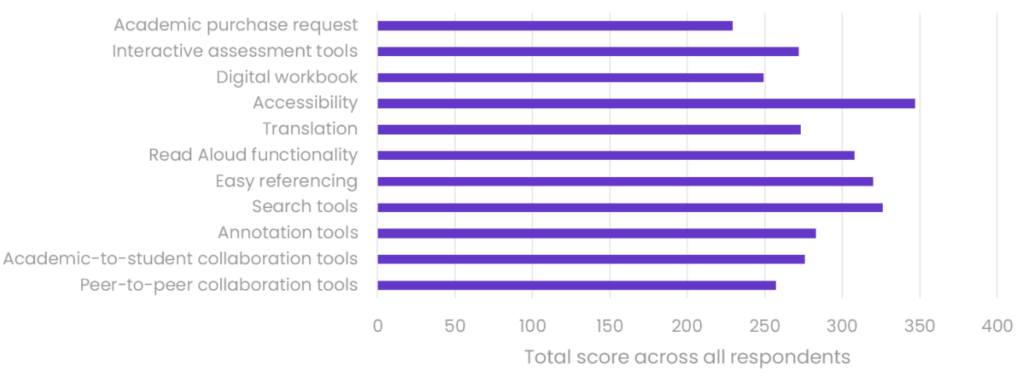
Choosing an eTextbook supplier
At Kortext, we understand the time and effort that goes into choosing an eTextbook supplier, and whilst cost is an obvious factor, for many university libraries, selecting a supplier is about more than just provisioning eTextbooks.
When asked to score a number of factors out of 10 when considering the provision of eTextbooks, expectedly, respondents identified value for money and license type as their top priorities; however, also scoring highly were student experience, platform functionality, range of titles and usage analytics, each scoring 8 or more out of 10. This indicates that university libraries understand the benefits that come with eTextbooks and could suggest that ‘value for money’ goes beyond the simple cost of titles, extending instead to added value features like analytics and intuitive interactive platform features.
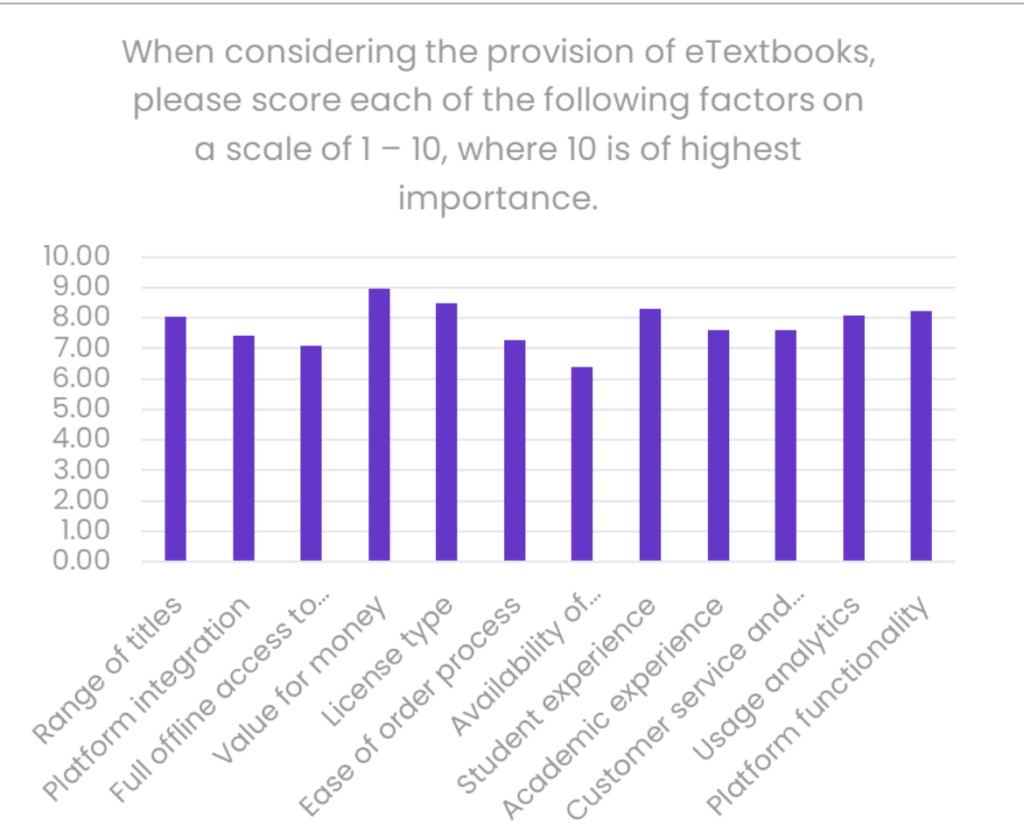
In fact, 70% of the librarians surveyed said their use of engagement analytics has increased in the last 12 months as they monitor content usage and student engagement data. With this information at their fingertips, university library staff and academics have the information they need to make more informed decisions about title selection, providing an opportunity to review what’s working and what isn’t.
When asked the open question – what would you consider to be the most important factor when deciding which supplier to use and why? – cost aside, speed and quality of customer service featured multiple times as well as a quick and simple acquisitions process and ease of integration into university systems. The latter is particularly important as universities strive to build a unified digital ecosystem that provides a seamless student experience. It is worth mentioning that the majority of librarians surveyed agreed that discoverability of learning resources is very important, so a unified system like the VLE that can integrate with other systems like the Kortext platform would surely have a positive effect on the student and their ability discover content.
Who should pay?
Of course, when it comes to core reading materials, views are mixed on who should pay, with just over half (57%) of respondents agreeing that students should not have to pay for their learning materials in addition to the tuition fees. Of this 57%, 23% said the cost should be absorbed into tuition fees, and 30% suggest government funds and university funds respectively.
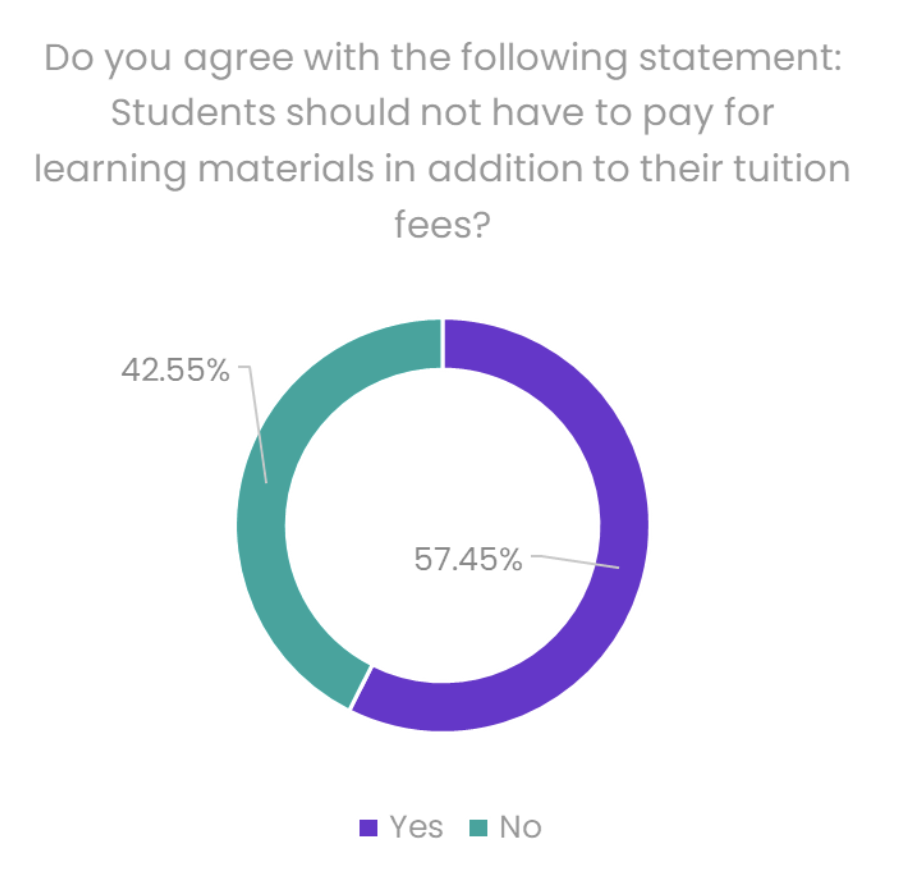
Over the next year and beyond, there are clearly high expectations for university libraries as they continue to support and facilitate teaching and learning at their institutions. The challenges evident as they navigate insubstantial budgets, publisher costs and licensing models, whilst finding new, affordable ways to meet student needs.
What’s positive to see is that, despite the challenges faced by library staff now and during the course of the pandemic, more than 85% of the library surveyed still find the role fulfilling and would recommend it to a friend.
As part of our commitment to our partner universities, Kortext is continuing to enhance the platform, improve the user experience for librarians, academics and students and is, indeed, already preparing to release developments that will benefit all users. As an aggregator that is close to both the publishing and university library communities, we will remain active in the conversation on publisher pricing to help the drive towards sustainable solutions. This commitment to university libraries is recognised by the UK’s major purchasing consortiums, where Kortext is assessed highest-scoring supplier for eTextbooks.
